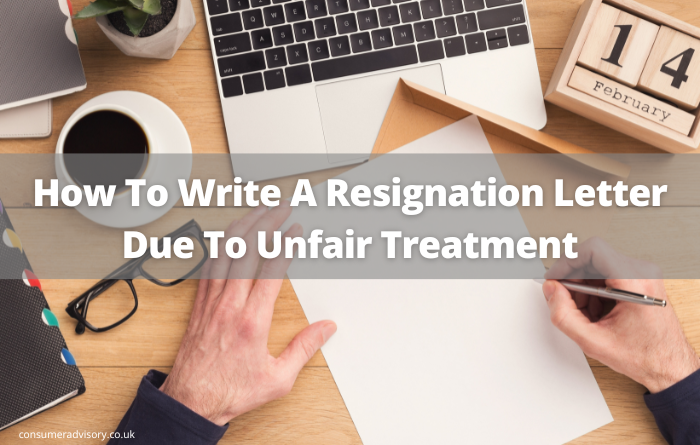
If you feel like you’ve been treated unfairly at work, you might feel like you have no choice but to resign. Whilst some issues can be resolved, others may mean that you feel you can no longer remain in your role. So, how do you write a resignation letter due to unfair treatment?
The most important thing is to remain professional whilst also explaining clearly your reasons for leaving. It’s always best to leave on a positive note, especially since you may need to rely on your employer for a reference later down the line. However, it’s important that you also explain your reasons for leaving.
In this article, we’ll explain exactly how you can write a professional resignation letter when you’re leaving your job due to unfair treatment, as well as answering some of the most commonly asked questions on this topic.
When you’re resigning from your job due to unfair treatment, it’s important that you take the following steps:
It can be difficult to remain calm and professional if you feel that you’ve been treated unfairly at work. However, if you’re planning to resign due to the unfair treatment, it’s best to remain professional until you’ve left the company as you may later need to rely on your former employer to provide a reference.
Once you’ve left the company, you can then begin legal proceedings for unfair treatment or constructive dismissal.
When you resign from your job, it’s important to do so in a professional manner. This means writing a resignation letter which is both polite and concise.
Here are the five steps to writing your resignation letter when you’re leaving due to unfair treatment.
Begin your letter by explaining that you have taken the decision to resign from your position and leave the company. In the next sentence, you should explain your reasons for doing this. It’s important to be clear and concise when explaining your reasons for leaving, as well as remaining professional throughout the letter.
Once you’ve introduced the situation, you need to outline the unfair treatment which you feel you’ve received. Again, it’s important to be factual and include any evidence which supports your claim.
Even though you’re leaving due to unfair treatment, it’s important to thank your employer for the opportunity to work with them. This shows that you’re willing to remain professional, even in difficult circumstances.
Once you’ve thanked your employer, you need to state when your notice period will end and you will be leaving the company. It’s important to give your employer enough time to find a replacement for you, so be sure to check your contract before stating a specific date.
Once you’ve stated when you will be leaving, finish your letter on a positive note by expressing hope that things will get better for your former employer in the future. This shows that you’re still willing to remain positive, even though you’re leaving the company due to unfair treatment.
It’s not essential to mention unfair treatment in your resignation letter. However, if you do feel that you’ve been treated unfairly, it’s important to include this in your letter so that your employer is aware of the situation.
This may also act as evidence in any future legal proceedings that you decide to take.

Unfair treatment at work can take many forms, including discrimination, harassment, and victimisation. It can also include being treated unfairly because of your race, religion, gender, or sexual orientation.
If you feel that you’ve been treated unfairly at work, it’s important to speak to your employer about the situation. If they’re unable to resolve the issue, you may need to consider taking legal action.
Unfair treatment at work can have a significant impact on your health and well-being, so it’s important to seek professional help if you’re experiencing this type of situation.
If you’re experiencing unfair treatment at work, you may be entitled to take legal action. This can include making a claim for discrimination, harassment, or victimisation.
You may also be able to claim for constructive dismissal if you’re forced to leave your job as a result of the treatment you’re receiving.
If you decide to take legal action, it’s important to get expert advice from a solicitor who specialises in employment law.
When you resign from your job, it’s important to do so in a professional manner, even if your reason for leaving isn’t a particularly happy one. The best way to resign professionally is to write a resignation letter. It’s much easier to sound professional in writing than in person, especially if you think your emotions are likely to take over if you resign verbally.
When you’re writing your resignation letter, there are a few things you should keep in mind. Firstly, it’s important to be polite and grateful for the opportunity to work with your employer, even if you’re leaving due to unfair treatment. Secondly, you should be clear and concise when explaining your reasons for resigning. And finally, you should finish on a positive note, expressing hope that things will get better for your former employer in the future.
By following these simple tips, you can ensure that you resign from your job in a professional manner, even if the circumstances are far from ideal.

If you’re resigning from your job due to constructive dismissal, it’s important to be clear and concise in your resignation letter. You should explain that you’re resigning because you feel that you’ve been left with no other choice, due to the unfair treatment you’ve received.
You should also include any relevant evidence to support your claim, such as details of any incidents of discrimination, harassment, or victimisation you’ve experienced.
If you’re planning to take legal action after leaving your role, it’s important to get expert advice from a solicitor who specialises in employment law.
If you’re writing a letter of resignation because you’ve raised a grievance at work, it’s important to be clear and concise in your letter. You should explain that you’re resigning because you feel that your grievance has not been dealt with fairly or properly.
You should also include any relevant evidence to support your claim, such as details of any incidents of discrimination, harassment, or victimisation you’ve experienced.
If you’re planning to take legal action after leaving your role, it’s important to get expert advice from a solicitor who specialises in employment law.
Writing a resignation letter due to unfair treatment at work can feel like a difficult task, especially if you’re trying to remain professional without your emotions taking over. We hope that this article has given you some useful ideas and suggestions.
This article is not intended to be legal advice and should not be taken as such. If you’re experiencing unfair treatment at work, it’s important to seek professional legal advice to find out what your options are.
Copyright © 2025 Consumer Advisory. All rights reserved.